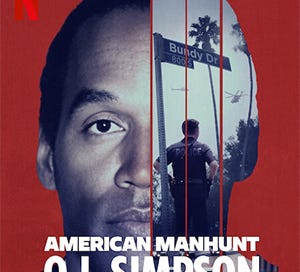"American Manhunt: O.J. Simpson," a Netflix four-part documentary, adds another perspective to the already extensive library of documentaries dissecting the "Trial of the Century," yet it offers fresh insights and visceral reminders of the case's enduring grip on the American consciousness. This isn't just historical record; it's a shared memory, a cultural touchstone. Like asking someone where they were when Kennedy was shot or man landed on the moon, if you were alive and old enough, you likely recall where you were during the O.J. Simpson chase. It was a Super Bowl-sized audience transfixed by their screens.
Where were you when the O.J. Simpson chase happened? I distinctly remember where I was during the infamous white Bronco pursuit—glued to a TV in LA’s Greek Theatre's hospitality area within Griffith Park, watching the surreal spectacle unfold as I awaited a concert. The chase, a novelty then, was so captivating that they eventually had to switch off the television so backstage attendees would take their seats.
The O.J. Simpson narrative felt strangely personal, even before I encountered Robert Shapiro in a Chicago hotel lobby that year. My boss's introduction, a brief moment, somehow connected me to the unfolding drama. This documentary, however, brings the case into sharper focus, particularly the sheer brutality of the crime scene. The graphic imagery is more disturbing than I recall, a stark reminder of the savage violence that ignited this media frenzy. The sheer volume of blood, the nature of the knife wounds, the brutal physical force involved – it's a far cry from the sanitized versions previously seen, and it underscores the human tragedy at the heart of this spectacle. Indeed, after viewing this documentary, it's difficult to harbor any lingering doubts about O.J. Simpson's guilt.
The series effectively portrays the case's progression, from the initial shock of the murders to the circus-like atmosphere of the trial. The skillful editing and mix of source material in each of the four episodes make them fly by, yet they're packed with information and details presented in a way that's remarkably easy to understand. The filmmakers do a superb job of balancing the complexities of the case with a compelling narrative flow. Each episode meticulously lays out the evidence, the strategies, and the individuals involved.
The presence of Chris Darden is especially compelling. He appears remarkably candid, openly discussing his trial role and even admitting his youthful miscalculations. His account of the "gloves" incident is particularly striking. He explains how O.J.'s arthritis medication was discontinued, causing his knuckles to swell, and how Judge Ito's insistence on surgical gloves further hampered the effort. Coupled with O.J.'s theatricality, it was a recipe for disaster. Darden's self-blame is evident, and it's hard not to contemplate how differently things might have transpired had that moment unfolded otherwise. It's a stark reminder of how seemingly insignificant details can influence the course of justice.
Ron Shipp, O.J.'s friend, provides another layer of emotional depth. His testimony, where he professed his affection for O.J. while acknowledging his guilt, is heartbreaking. Shipp's internal conflict between loyalty and conscience makes him a tragic figure. He's the friend who, despite his feelings, ultimately became a turncoat, testifying for the prosecution.
Mark Fuhrman, a key figure, is also featured prominently. He's surprisingly candid about his past and the accusations of racism that plagued the prosecution. His narrative, while not excusing his past actions, adds another layer of complexity. But for me, the true star is lead detective Tom Lange. His calm, methodical approach and insightful commentary are incredibly persuasive. He presents the evidence with such clarity that it's difficult not to concur with his conclusions.
Carl Douglas, with his uniquely dramatic and descriptive oration, offers invaluable insights into the defense's tactics. He effectively illustrates how the "Dream Team" skillfully sowed seeds of doubt and fostered conspiracy theories, ultimately preventing the jury, and much of the public, from accepting O.J.'s culpability. Douglas's perspective clarifies how the defense leveraged racial tensions and existing mistrust of law enforcement to create a narrative that resonated with a substantial portion of the population. The documentary highlights the "mountain of evidence" against O.J., some of which, like bloody fingerprints and the contents of a disheveled first-aid kit, never reached the courtroom. We also learn of eyewitness accounts, such as the woman who saw O.J. driving erratically after leaving the crime scene and the individual who saw him discard a bag at LAX before his flight.
"American Manhunt" also emphasizes the groundbreaking role of DNA testing in the trial. For many, it was their initial exposure to this nascent forensic science. The defense, however, was somewhat successful in questioning the reliability of the DNA evidence, asserting that the blood samples were mishandled and tainted. The series suggests that O.J. Simpson likely exhibited sociopathic tendencies, enabling him to compartmentalize his actions and maintain a pretense of normalcy.
"American Manhunt" doesn't ignore the racial tensions that permeated the trial. The documentary powerfully illustrates how race played a crucial role in the courtroom and the public's perception. And viewing it now, years later, the echoes of the Rodney King verdict, which occurred just two years prior, resonate even more strongly. The O.J. Simpson trial wasn't simply about a double murder; it was a referendum on race, celebrity, and the American justice system. This documentary is a potent reminder of that tumultuous period and its lasting impact. It leaves you contemplating not only what transpired, but also its significance.
— Rob Tonkin




I was sitting in Victoria Sellers living room absolutely glued to the TV. We couldn't believe it.
This is a Great review of the documentary of what was an iconic moment in recent history.